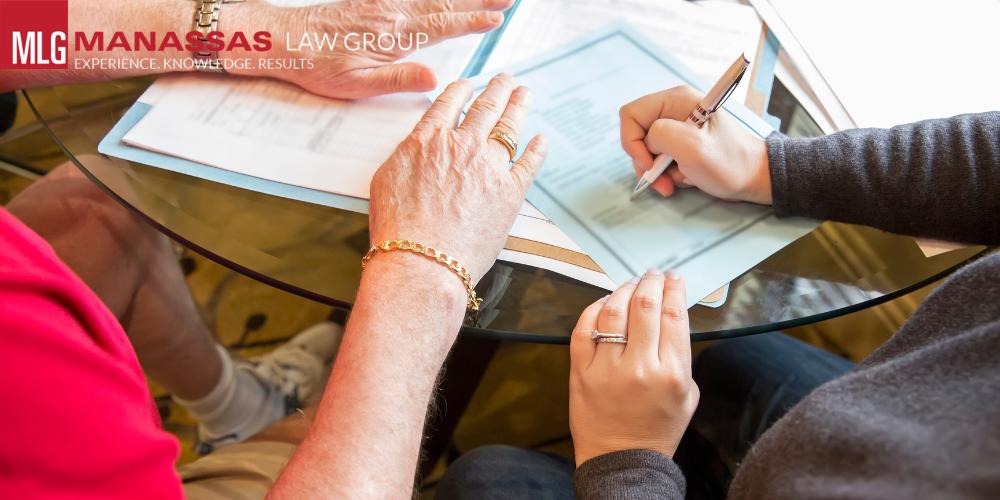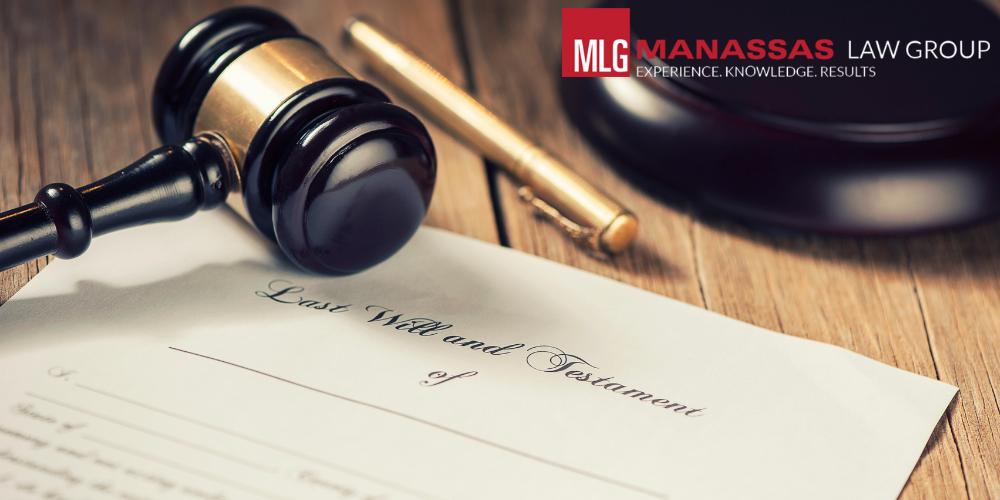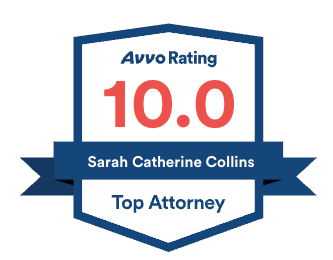Estate Planning
PRACTICE AREAS

Fauquier County Estate Planning Lawyer
Helping Clients in Fauquier County, VA and Surrounding Areas With the Estate Planning and Probate Process
Legal issues aren’t exactly what you want to deal with when you’re mourning the loss of your loved one. How can you focus on their wills, trusts, probate, or taxes when you’re coping with the loss of someone you love? And if you’re trying to plan for the future, how do you make it easier for your family and friends?
These are the reasons why hiring an estate planning attorney in Fauquier County, VA like those at Manassas Law Group can be so beneficial. The experienced estate planning lawyers at our law firm will guide you through every step of the process. For more information on what we do, when you need us, and how we can help, give us a call at (703) 361-8246 today.

What is an Estate Plan?
An estate plan outlines your preferences and priorities for your estate if you become unable to make decisions due to illness or death. An estate plan is not a single document, but several tools that explain what should happen in any given situation clearly.
Your estate includes all the things that you own- cars, house(s), land, savings, businesses, etc. When someone passes away, their estate must be allocated appropriately according to the law and according to their own wishes in many cases. The laws on what assets go where and who can take what can be a complex legal issue at times. This is why you need a Virginia estate planning attorney to guide you through and help you with asset protection.
What Does an Estate Planning Lawyer Handle?
Estate planning lawyers work not only with their clients but also with tax professionals and financial advisors in order to create a plan that fits the client’s estate planning needs. The last thing your mourning family needs or wants is to deal with legal issues. Depending on your situation, your estate planning attorney may:
- Prepare a will and/or other estate planning documents
- Identify your beneficiaries
- Create plans for long-term care or advanced directives
- Help determine whether you should establish a trust and which type of trust you would benefit from most
- Identify ways to avoid probate litigation
- Work alongside a financial advisor to help reduce the burden of estate taxes with effective tax planning
- Establishing limited and/or durable power of attorney
We’ll go into more detail about each of these functions and how the estate planning attorneys from Manassas Law Group can help ensure your assets are protected.

Wills and Trusts
Wills and trusts are similar because they are both legal entities that decide who will inherit your assets. While they are similar in this manner, a last will is effective when you die, while a trust goes into effect immediately after being signed.
A will can:
- Name guardians of pets and children
- Designate where your assets will be placed
- Appoint an executor
- Provide specific final arrangements based on your wishes
Though a will can designate where your assets will be placed, they are still likely to have to go through probate. A trust is a little more complicated than a will; however, it has added benefits. Funds and other assets can be owned by a trust, which is managed by a Grantor.
A trust can:
- Offer more control over distribution of assets
- Apply to any assets included in the trust
- Come in a variety of forms and types
For instance, Revocable Trusts can be used to pay expenses for long-term care, nursing home fees, hospital expenses, etc. There is also a special needs trust which can hold funds that are intended to be used for the care of a special needs relative when you or a loved ones are unable to provide it.
Probate
Probate is a legal process in which assets that have not been provided for are transferred after the death of the owner. Probate is required only for assets that the deceased person owned by themselves. Assets held in a trust are able to avoid probate court because the trust owns them. Assets owned jointly with another person can typically pass directly to the other person without going through probate court.
If the deceased has assets that have to go through probate court, the person that is named executor in the will must present themselves and the signed will to the district circuit court that is appropriate. Under Virginia law, this will be where the home was owned by the deceased at the time of their death, or if they died in the hospital or a nursing home, where they previously resided. The executor will then become the administrator or personal representative during the probate process.
The personal representative has the responsibility of determining the value of the estate along with settling all debts and taxes left by the estate. Probate law requires a tax that is determined by the value of the estate, as well as the deceased’s final income taxes, etc. After all debts and taxes have been paid and the will is authenticated, the remainder of the assets can be distributed by the will’s instructions.
The probate process is generally a lot of paperwork that is tedious. The only time a judge would need to be involved is if there is a legal issue or disagreement in need of settling. Probate litigation can be difficult and frustrating, especially with a large number of heirs or a larger estate. Many people choose to work with a probate attorney for that reason during their life to avoid the probate process after their death.
Guardianship and Conservatorship
Guardianship and conservatorship are paths taken by family members for an elder or other relative whose estate plan might not have made allowances for every eventuality. For example, a guardianship or conservatorship may be helpful in the case where a relative may not have created a will and signed a power of attorney allowing someone to make medical decisions for them, but develops dementia and can no longer make their own financial decisions.
To become a guardian, a petition must be filed with the local circuit court. A judge will then decide whether the person that is allegedly incapacitated or is actually incapacitated. The judge will also make a decision of how broad the authority of the guardian will be based on the capacity of the individual in question.

Tax Planning
The overall goal of estate tax planning is to reduce the burden of estate taxes on your heirs once you’re gone. Without methodical planning, much of your estate assets might be diminished by estate taxes. Virginia is entitled to a percentage of your estate before it is passed down to your heirs. Gift taxes can also be significant, meaning that if you try to make gifts to your heirs over a specific amount, the amount is subject to taxation.
Attorneys can utilize a variety of strategies to preserve your estate from these taxes mentioned. Many estates are free from the burden of tax avoidance planning thanks to the reform to the Federal Estate and Gift tax laws. Tax law, however, is complex. Proactive planning will still be required for those estates that are impacted.
Do You Need an Estate Planning Lawyer?
While many people might feel it’s morbid to think about planning for what happens to their assets after they die, it has many benefits. Having a tight-knit plan in place for all of your assets can save your loved ones money and effort after you’re gone.
Creating a comprehensive, legally binding plan can aid in eliminating conflict, confusion, and undue emotional stress following your death. This will allow your family to focus on mourning and coping with the loss of their loved one.
What happens if things change before your death? You may think it’s too early in life to begin estate planning, however, this will allow you to make any necessary changes. A Virginia estate planning attorney will be able to make timely changes to your estate plan in the event of births, marriages, and divorce.
Estate planning is not just for the rich. Any person that has personal belongings, dependents, etc. can and should make an estate plan.

Estate Planning Services in Fauquier, VA
When it comes to estate planning in Fauquier County, VA, the Manassas Law Group should be your first choice. Our team of experienced attorneys has been providing legal counsel to clients in this area for years. We offer an initial consultation to all potential clients to help them understand the legal options available to them. Our team is well-versed in the state law governing estate planning, and we can help you protect your assets and plan for the future. We offer a range of services, including estate administration, estate litigation, and helping you plan for the care of your family members after your passing.
Our clients come first, and we take pride in providing personalized attention to each case. If you’re located in Fairfax County, Fauquier County, or the surrounding areas and need estate planning services, contact the Manassas Law Group today by calling (703) 361-8246. We’ll guide you through the process and ensure that your estate is protected for generations to come.














